#the entire fucking Doomed By The Narrative thing he has going on is self inflicted like we KNOW this. he literally kills himself
Explore tagged Tumblr posts
Text
i have decided that my interpretation of c!wilbur’s ominous foreshadowing after the “Bust” stream is that he was suicidal and increasingly planning on committing suicide as his character heavily alludes to (because i believe that negating the suicidal overtones of cwilbur during this portion of his story by saying that he was always only ever planning on going back to utah: # 1 just lessens the impact of everything that happens in this arc, because he wouldve already decided to live thus making all those conversations and apologies forcing him to confront the realities of his own life and death wayyy less meaningful, but most importantly # 2 makes it impossible to provide adequate closure for his character’s deepest struggles because they wouldve never been re-addressed) — BUT that when he finally decided to go through with sending friend to ghostbur thus making the evident conclusion that ghostbur did not deserve to suffer eternally (and by extension and implication, himself, too) he changes his mind and chooses Life :) aka Utah <3
#(from drafts — posting this now cause theres a lore ask i wanna answer that requires establishing some precedent of my interpretation here)#this is how i rationalize and interpret the final stream to fit my needs as a viewer and analyst#because taking it at face value of aha he was never suicidal he just was going to utah! always felt SOOOOOO BAD to me#that was like my main issue with the entire concept#so this interpretation allows me to enjoy the utah ending a lot more /gen /pos#tw suicide#myanalysis#like the entire point of revivebur was him learning how to live and enjoy living again like i cannot stress enough how important it is that-#-these moments that really explicitly address his suicidality are NOT overwritten#the entire fucking Doomed By The Narrative thing he has going on is self inflicted like we KNOW this. he literally kills himself#so by extension. Obviously. him Freeing himself from the narrative by fleeing to utah Also needs to be accompanied-#-by him addressing and choosing to not give in to that suicidality a second time. like thats the entire point#it just makes the most sense to me
248 notes
·
View notes
Note
What do you think are the most tragic love stories in tv shows and movies that you've seen?
OK, so, spoilers. I’ve mentioned all of these couples already so I’m sorry if it’s repetitive. And this isn’t in any particular order.
Jax and Tara, Sons of Anarchy
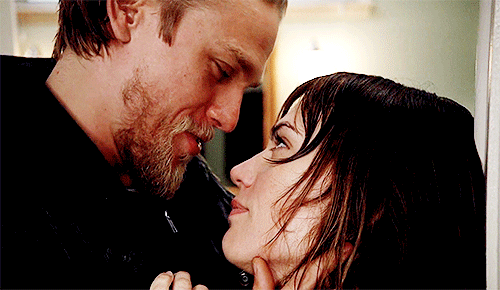
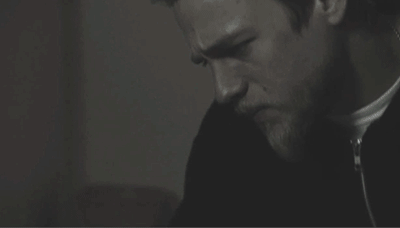
I mention them a lot but Jax and Tara had such an embedded love and an intense pull, it had been ten years since she left Charming but when she got back they were immediately drawn into each other.

Their relationship was a source of hope for Jax while also a source of conflict because it was the only other thing that he loved as much as his club while with Tara, her love for Jax was undeniable but it took her to really dark places yet provided a lot of good in her life like her two sons and the love of a man who would do anything for her, anything except leave his club. But when he finally puts her first, finally puts his family first, when he’s finally being just a husband and a father and they reconcile after the amount of damage they inflicted on each other, she’s brutally murdered:

Noah and Rosalee, Underground
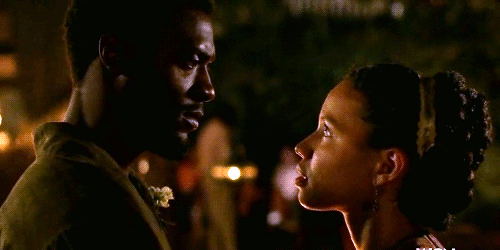
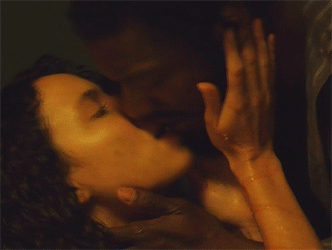
It’s only the second season of Underground so the fate of their relationship hasn’t been decided yet but it’s tragic because well Underground is about enslavement and about the various avenues taken to dismantle it and the main characters were a group of enslaved people who ran away from their plantation. Noah was the ring leader, passionate and devoted and committed and he believed in Rosalee when she couldn’t even see her own strength. Throughout the period of them running from the law and slave catchers and just white civilians, they have these moments of respite where they can gaze at each other or touch one another but then they have to keep moving because they’re fighting for their lives. When they finally are like a step away from freedom, they can finally have a moment long enough to consummate their love.
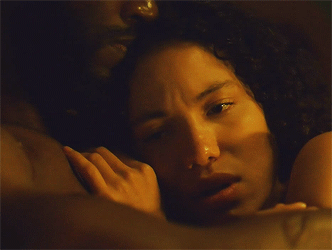
However, Noah is recaptured almost immediately after they have sex and Rosalee spends a lot of time and makes a very risky plan to get him back and you think that she will succeed because Noah escapes

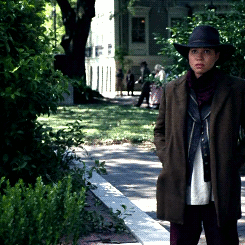
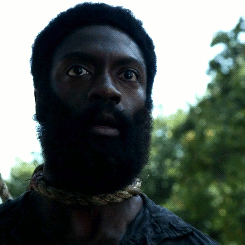
but then he’s once again recaptured and she doesn’t know if he’s alive or dead.
Alisha and Simon, Misfits


Alisha was originally very mean to Simon because he was an outcast and a loner and frankly, weird, but then Simon from the future comes to the present to save Alisha’s life because in the future Alisha dies and she ends up falling in love with Future Simon which helps her fall in love with Present Simon except Future Simon dies protecting Present Alisha while Future Alisha had already died so basically they were both doomed to die.

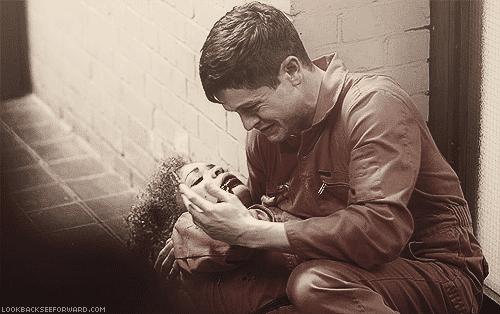
Jal and Chris, Skins UK

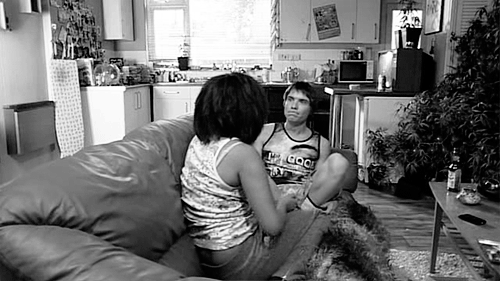
Jal and Chris are a relationship in which the “overachiever” and “screw-up” relationship works really well because Jal is supposed to be uptight and focused and she’s very critical while Chris parties and does way too many drugs so one day they decide to help each other, where Jal has to say “Yes” to things because all she does is say “no” and Chris has to stop saying yes or his tagline “fuck it”

and try so they actually nuance each other and they go through a lot, he deeply hurts her and she goes through some unexpected challenges but they manage to make it through and then he dies:

Naevia and Crixus, Spartacus

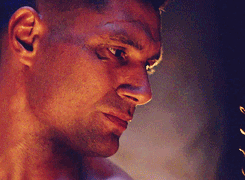
Crixus and Naevia are tragic in two parts. The first part is Spartacus: Blood and Sand (this is the Naevia I prefer, they changed actresses in Spartacus: Vengeance) so Lucretia who is the domina, mistress, of the household uses Crixus as her sex slave, he’s only supposed to belong to her but Crixus falls in love with Naevia who is Lucretia’s “most trusted” personal slave so there are moments for instance where Naevia has to watch Lucretia and Crixus have sex and stand guard in case Batiatus, Lucretia’s husband, comes home. If that isn’t enough Batiatus gives Naevia to Ashur who is Crixus’ enemy and Ashur rubs it in his face so Crixus goes ballistic which lets Lucretia know that Naevia and Crixus were together so Lucretia beats Naevia

and then sells her off to be a sex slave, she’s used as a “gift”, being dragged to different households for esteemed men to rape in order for the House of Batiatus to gain favour.
When Crixus and Naevia finally reunite (this is the new actress), they end up dying.
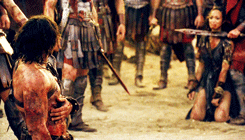
Spartacus and Sura, Spartacus

Spartacus defied a Roman and was condemned to slavery along as his wife (but separately), Batiatus trains him to be a gladiator and says that if he fights and wins in the arena, he will be reunited with Sura. However, Spartacus is disobedient and rebellious, he has no regards to actually “honour” his master, he just cares about Sura and that’s a problem because his fights in the arena are gaining favour for Batiatus so he needs him so Batiatus has her delivered to Spartacus but tells the man who drives her to slit her throat before entering the gates so Sura dies in Spartacus’ arms.
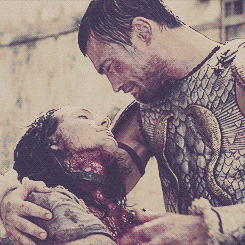
Pietros and Barca, Spartacus


Pietros is a soft, young slave and Barca is a formidable gladiator who only shows his softness with Pietros and Barca wants to wins enough money to buy him and Pietros freedom but Ashur owes Barca a lot of money that he won’t pay so Barca threatens to kill him so Ashur creates a series of events that end with Batiatus slitting Barca’s throat, they then tell Pietros that Barca bought hiss own freedom and left him behind so obviously Pietros is heartbroken but then because Barca isn’t around to protect him he is consistently raped and beaten by another gladiator so Pietro commits suicide.
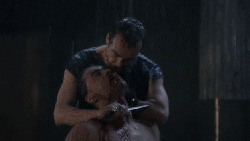
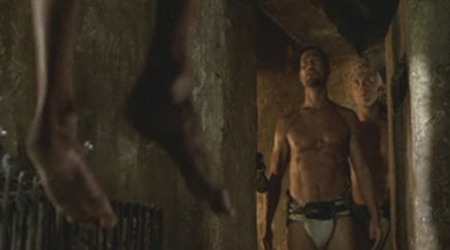
Silas and Amara, The Vampire Diaries


They were barely onscreen together and their story is really short but it’s really sad and that Dobsley chemistry, man.


Cesare and Lucrezia, The Borgias


OK, Cesare and Lucrezia is an interesting case because it’s incest and I usually find the inclusion of incest in narratives gratuitous, like, why but the reason why Cesare and Lucrezia worked for me is because I thought the show did an excellent job in showing the shame and the guilt and the self-disgust that comes out of a dynamic like the one they have, Cesare is inwardly torn to shreds about how he feels for Lucrezia but it’s this overwhelming force that Lucrezia describes as, “a dark cloud descended upon me” and I find them tragic because who wants to feel this way? The situation is entirely fucked up and it affects them fundamentally:
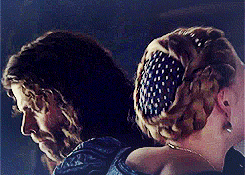

Mickey and Ian, Shameless
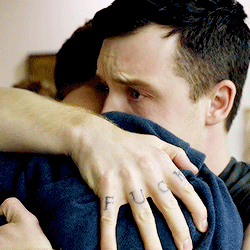
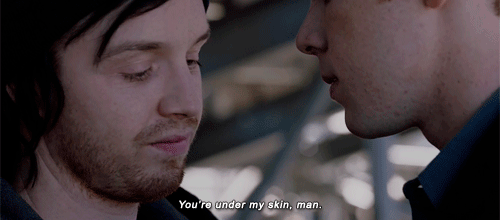
No one dies, just, they don’t end up together and after all the shit they went through and everything they mean to each other, it’s just tragic that they’re not together.
Stefan and Elena, The Vampire Diaries


No explanation needed.
Buffy and Angel, Buffy The Vampire Slayer


I find it both beautiful and messed up that as long as Buffy and Angel love each other they can’t be together because the minute Angel experiences any form of true happiness, he loses his soul so they have to stay away from each other, it’s an inherently doomed relationship:



Robb and Talisa, Game of Thrones
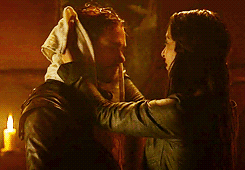

I mean, *sigh* I have conflicting feelings about Talisa and Robb because Robb was my favourite character until Talisa because he was such an idiot and short-sighted and just, he was such a badass until he fucked up over her and that pissed me off but I still liked their scenes together and it did not need to go down the way it did.
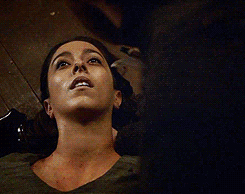

That’s all for now.
#stelena#gallavich#simon x alisha#jal x chris#noah x rosalee#robb x talisa#pietros x barca#naevia x crixus#spartacus x sura#silas x amara#simara#cesare x lucrezia#the borgias#the vampire diaries#shameless#skins#misfits#underground#game of thrones#spartacus blood and sand#jax x tara#sons o anarchy
62 notes
·
View notes
Text
The Best Books of 2017 (So Far)

Now that we’re one-third of the way through the year, we decided to round up our picks for the best books of 2017 (so far). From thrilling sci-fi to Latin American fiction, illuminating memoirs to eclectic short stories, our favorite titles promise enthralling reads for every literary taste.
We’ve assembled 20 books released from January through April, including novels, short story collections and nonfiction books. Browse our favorites below (listed in alphabetical order by title), and check out our lists of the best novels and best nonfiction books of 2016 for more great reading recommendations.
4 3 2 1 by Paul Auster
4 3 2 1 kicks off with as challenging a premise as Auster has ever constructed: four parallel narratives chronicling four different lives of the same character, Archie Ferguson. Although Auster chooses not to reveal why we’re reading about four versions of the same guy until the last half-dozen of the novel’s nearly 900 pages, 4 3 2 1’s real power radiates from each Archie’s adventures with love, sex, friendship, risks, books, writing and ideas. With this book, Auster has delivered the finest—though, one hopes, far from final—act in one of the mightiest writing careers of the last half-century. —Steve Nathans-Kelly
All the Beloved Ghosts by Alison MacLeod
MacLeod blends memoir and fiction to stunning effect in her short story collection, blurring the lines between life and death as she explores the nature of memory. In “Sylvia Wears Pink in the Underworld” and “Dreaming Diana: Twelve Frames,” she examines our relationship to celebrities after their death. While in stories like “The Thaw” and ‘The Heart of Denis Noble,” MacLeod crafts intimate portraits of individuals at the end of their lives. The collection’s haunting prose is by turns heartbreaking and uplifting, transforming the stories’ heavy themes into something entirely unique. —Bridey Heing
The Animators by Kayla Rae Whitaker
Brimming with electricity, Whitaker’s novel boasts witty prose and two vibrant main characters. Sharon and Mel, a straight laced go-getter and a troubled-genius wild card, are rising stars in the indie-animation scene. Theirs is not so much a relationship story as a portrait of Gen-Y creatives navigating the pressures of success (and their own baggage). And by combining their engaging personalities with a handful of intriguing twists, Whitaker has crafted one of 2017’s first page-turners. —Jeff Milo
Exit West by Mohsin Hamid
Hamid has always had a finger on the global pulse, publishing stories hot on the heels of the latest headlines. And though Exit West was completed nearly a year before Trump’s travel ban on Muslim-majority countries, its timing is perfect. The novel opens in an unnamed city (feasibly located in one of said countries) that’s tipping towards civil war and swollen with a sea of refugees. Then we meet Saeed and Nadia, young adults falling in love just as their world is falling apart. Their hope is kindled by rumors of mysterious doorways that transport people to undetermined locations. These doors have supernatural powers, but the way Hamid weaves his story, you’ll believe that they’re real. And, in a way, they are. —Jeff Milo
Flâneuse by Lauren Elkin
Elkin’s latest book draws on literature, art and history to create a globe-spanning study of women walking alone in cities. The title comes from the French word “flâneur,” a term for privileged men who meander through a metropolis. Women, Elkin argues, have just as much claim to cities as men, but their relationship with cities has long been ignored. From George Sand to Virginia Woolf to Sophie Calle to Martha Gellhorn, Flâneuse demonstrates how women have staked their independence in urban landscapes around the world. By including her own experiences in cities like Paris, London and Tokyo, Elkin crafts an expansive portrait of what it means to be a woman in a city. —Bridey Heing
Homesick for Another World by Ottessa Moshfegh
A great deal of (digital) ink has been spilled comparing Moshfegh to Flannery O’Connor, but Moshfegh’s short story collection establishes a firm connection to “horror-adjacent” writers Angela Carter and Shirley Jackson. Like Carter, Moshfegh finds near-infinite literary possibilities in the world of fluids and bodily flaws, from colostomy bags to sagging private parts to foul teeth. And like Jackson, Moshfegh’s characters are often young people on paths toward self-inflicted destruction—or at least continued unhappiness, for happy endings are all but nonexistent here. Moshfegh’s skill lies in her ability to present horrid people without judgment. She isn’t here to moralize, but to deliver enough dark humor that we can almost understand where the nastiness comes from. Almost. —Steve Foxe
How to Murder Your Life by Cat Marnell
Press surrounding Marnell’s book deal was dripping with venom. Yellow headlines blared—even a publication as august as The Atlantic couldn’t resist running the headline, “Cat Marnell’s Book Deal Could Buy a Lot of Drugs.” The entire saga was laced with hatred, because although Marnell was achieving media success directly because of her sickness, she was not afflicted with something relatable like cancer. Her main condition, the least pitied of all pathologies, is addiction. Yet Marnell’s memoir is fucking wonderful. Her voice is her single greatest asset—a pure stylist who can tackle both beauty tips and the savage electricity of a life on amphetamine. How to Murder Your Life turns the addict, trucked with so many gallows watchers’ outrages, into her own fully-formed person. —B. David Zarley
The Kingdom by Emmanuel Carrère
The latest book from France’s master of groundbreaking nonfiction is pure Carrère: forthright, ruthlessly self-analytical and endlessly brilliant. The bestselling author of novels, screenplays, biographies and essays, Carrère begins the book by confronting his past as a devout—if comically pretentious—Catholic, a past the middle-aged writer had apparently forgotten before re-encountering the notebooks he kept from that time. The Kingdom soon transforms into something much weirder, though, as Carrère fictionalizes the early decades of the Church, transforming the book into an extended parable of his own enthralling life. —Lucas Iberico Lozada
Lincoln in the Bardo by George Saunders
After decades of brilliant work in the brief yarn vein, Saunders has released his first novel. Set in 1862, Lincoln in the Bardo features the 16th President and a Washington graveyard full of ghosts—including the president’s recently departed son, Willie Lincoln. Saunders’ host of voices provides us with a chance to see what lies on the doorstep of the beyond, and it’s a humdinger; spectral psychology is alternatively denial and dismemberment of the things of this world. By turns moving and hilarious, Lincoln in the Bardo proves there is life after death—and more than short stories in the splendid Saunders. —Jason Rhode
The Lucky Ones by Julianne Pachico
By turns surreal, confounding, terrifying and improbably funny, The Lucky Ones explores Colombia’s specter of guerilla violence through the adventures of a few young women. While the characters’ common history as boarding school students provides a loose framework for the novel’s interlocking stories, The Lucky Ones presents a view of the conflict that is endlessly fascinating, but more prism than lens. Its perpetual perch on the edge of disaster leaves the reader in a state of dread, but Pachico creates a palpable anguish with a light touch, a combination that makes this astounding first novel as irresistible as it is unnerving. —Steve Nathans-Kelly
Norse Mythology by Neil Gaiman
Gaiman has built a decades-long career out of weaving myths into new shapes, perhaps most prominently in American Gods, which borrows from Norse legends. So Norse Mythology reads like a natural culmination of Gaiman’s allusion-heavy path through literature, as the master storyteller joins the ranks of bards who have kept the fragmented pieces of Norse legend alive. Beginning at creation and ending at Ragnarök, Gaiman brings his signature wit and humor to a saga known for its violence and ever-impending doom. His Thor is a lunkhead; his Loki is conniving. And his Norse Mythology is both intrinsically Gaiman and exactly what the title promises. —Steve Foxe
Notes on a Banana by David Leite
The James Beard Award-winning food writer’s memoir is about being Portuguese, gay and in love with food. But it is first and foremost about being bipolar. Leite’s work belongs in the great Canon Of Mental Illness, a rending portrait of a bipolar sufferer’s parabolic life—with an extra emphasis on mania, the less understood phase of the disease. It’s Leite’s deft portrayal of mania, written with the celerity and buzzing hagiography that are hallmarks of the condition, that gives Notes On A Banana its chimerical quality: equal parts memoir, case study and, for those who suffer along with Leite, both signal and solace. —B. David Zarley
The Novel of the Century by David Bellos
Not everybody loved Victor Hugo’s masterpiece, Les Misérables, when it was first published in 1862. As Bellos writes in his new book, opinions varied widely: Flaubert and Baudelaire loathed it, but Confederate soldiers christened themselves “Lee’s Miserables.” Bellos shows that Hugo’s giant tome, le Léviathan of French literature, was huge in every way: in its scope (the totality of the 19th century), physical volume (over a thousand pages) and morals—Hugo aimed at nothing less than the salvation of humanity, France and, incidentally, himself. Everything you ever wanted to know about the classic is included; this is the definitive book of the novel of the century. —Jason Rhode
A Separation by Katie Kitamura
Kitamura’s new book is a novel-length meditation on what it means to belong to someone else—and then, suddenly, to not. The unnamed narrator has recently separated from her husband of five years, Christopher, but the information isn’t public yet. It’s a private wound that begs to be explored. But when Christopher goes missing in Greece, it’s the narrator who must search for him—despite questioning if she even has the right to find him. Gorgeous, lyrical and provocative, A Separation asks challenging questions about the nature of coming together and breaking apart. —Swapna Krishna
The Stranger in the Woods by Michael Finkel
The latest book from journalist and author Michael Finkel hangs on one tantalizing question: How was a man able to live in solitude for 27 years in the woods of central Maine? The capture of the so-called North Pond Hermit (during one of the 1,000+ break-ins that sustained him over the years) became major news in 2013, catching Finkel’s attention across the country. The author patiently pursued interviews with the hermit, crafting a fascinating and empathetic portrait of a man who turned his back on the world. —Eric Swedlund
Things We Lost in the Fire by Mariana Enríquez
Enríquez’s first short story collection to appear in English is part of a wild and weird wave of contemporary Latin American fiction reaching American readers this year. (Enríquez’s translator, Megan McDowell, can claim a significant amount of credit for that happy fact—she’s translated some of the past few years’ most exciting books.) The stories in Things We Lost in the Fire unfold in unexpected ways, tending to descend into horror while remaining very, very funny along the way. Enríquez successfully transforms the banal routines of middle-class life into a terrifying grotesquerie, all while threading a faint whiff of punk rock delivery throughout. —Lucas Iberico Lozada
The Twelve Lives of Samuel Hawley by Hannah Tinti
In the nine years since her debut novel, The Good Thief, was published, Tinti has crafted another masterpiece. The Twelve Lives of Samuel Hawley explores a captivating father-daughter relationship, weaving the pair’s saga through two narrative timelines. The first follows a young girl named Loo as she comes of age in a small Massachusetts town. The second reveals her father’s past through 12 stories chronicling the events that led to his 12 bullet wounds. The result is a fascinating literary thriller, with Tinti building the tension as both timelines count down to the final gunshot. —Frannie Jackson
Universal Harvester by John Darnielle
The second novel from The Mountain Goats’ frontman delivers an unsettling journey to the late-1990s era of video rental stores and dial-up Internet, a recent past that feels strange enough to carry this edgy mystery. In small-town Iowa, a twenty-something video clerk sets out in search of answers after discovering that someone has been splicing homemade footage into the store’s VHS tapes. With Darnielle’s inimitable voice driving a narrative that’s both sad and frightening, Universal Harvester explores loss, grief, resiliency and the never-ending search for human connection. —Eric Swedlund
Waking Gods by Sylvain Neuvel
Countless authors have answered the question, “What if we’re not alone in the universe?” But Neuvel’s response sets him apart. His Themis Files series, launched in 2016 with Sleeping Giants and continued this year with Waking Gods, begins with a deceptively simple premise: a child discovers a giant metallic hand buried in South Dakota. What follows is a global hunt for the artifact’s significance, relayed through interviews conducted by an unnamed man (who quickly becomes a favorite character) and peppered with transcripts, journal entries and other forms of media. Sleeping Giants may have debuted his thrilling saga, but Waking Gods proves that Neuvel’s scope is more daring than readers could have imagined. —Frannie Jackson
The Wanderers by Meg Howrey
What comes before a Mars mission? Why, simulations, of course. In The Wanderers, Howrey tackles the behind-the-scenes drama at Prime Space—a private aerospace company attempting to place astronauts on Mars within four years. Protagonist Helen Kane has just retired after 21 years at NASA, but now Prime Space wants her for a full Mars simulation mission. And once it’s completed, she’ll be the top candidate for the actual journey. Howrey’s literary novel is as much a character study as it is about space, exploring Helen and her crewmates’ profound isolation on their simulated journey.
0 notes